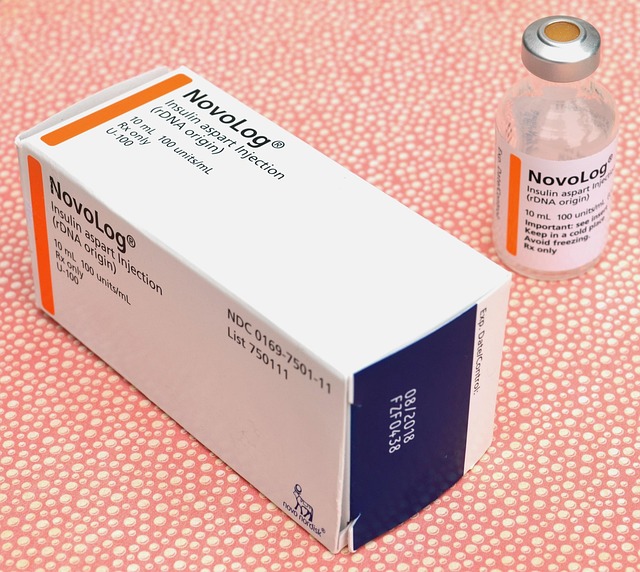Semaglutide is a groundbreaking semaglutide obesity medication that revolutionizes weight management by mimicking the body's natural GLP-1 hormone. Its dual action induces feelings of fullness, reduces appetite, and improves insulin secretion, offering significant benefits for both obesity and type 2 diabetes. Clinical trials show substantial weight loss (8-10%) and improved health markers, positioning semaglutide as a game-changer in holistic metabolic well-being. While it carries gastrointestinal side effects that often resolve, more serious risks require medical monitoring, especially with regular injections and close healthcare provider involvement.
Obesity is a global health concern, but advancements in treatment offer hope. Semaglutide, a glucagon-like peptide-1 (GLP-1) receptor agonist, has emerged as a potent semaglutide obesity medication. This article delves into the mechanisms behind its effectiveness in weight loss and explores the broader health improvements associated with its use. We examine clinical trials, potential side effects, and accessibility, providing a comprehensive overview of semaglutide as a transformative treatment for obesity.
Understanding Semaglutide: A Glucagon-like Peptide-1 Receptor Agonist

Semaglutide is a groundbreaking medication that has shown remarkable effectiveness in the battle against obesity. It works as a Glucagon-like Peptide-1 (GLP-1) receptor agonist, mimicking the natural hormone GLP-1 produced by our bodies after eating. This action helps to reduce appetite and slow digestion, leading to decreased food intake and weight loss. As a semaglutide obesity medication, it offers a novel approach to managing body weight compared to traditional diet and exercise methods.
By activating GLP-1 receptors, semaglutide promotes feelings of fullness and satiety, making it easier for individuals to stick to healthier eating habits. Additionally, it enhances insulin secretion in a glucose-dependent manner, improving blood sugar control in people with type 2 diabetes or prediabetes. This dual action not only aids in obesity reduction but also provides a comprehensive strategy for managing metabolic health risks associated with excess weight.
The Role of Semaglutide in Obesity Management

Semaglutide, a groundbreaking medication in the fight against obesity, has gained significant attention for its dual role in weight management and improving overall health. As a long-acting glucagon-like peptide-1 (GLP-1) receptor agonist, semaglutide mimics the natural hormone GLP-1, which plays a crucial part in regulating blood sugar levels and appetite. This innovative approach not only aids in obesity reduction but also offers a wide range of health benefits.
In the context of semaglutide obesity medication, its mechanism of action is key. By enhancing the effects of GLP-1, it promotes feelings of fullness, leading to decreased food intake and subsequent weight loss. Furthermore, semaglutide has been shown to improve insulin sensitivity, reduce appetite-related hormones, and lower blood pressure, all of which contribute to a healthier lifestyle. This multifaceted approach makes semaglutide a game-changer in obesity management, offering a more comprehensive solution beyond traditional dietary and exercise interventions.
Mechanisms Behind Semaglutide's Effect on Weight Loss

Semaglutide, a revolutionary semaglutide obesity medication, has gained significant attention for its dual role in treating type 2 diabetes and promoting weight loss. The medication works through several mechanisms to achieve this remarkable effect. Primarily, it enhances insulin secretion in a glucose-dependent manner, facilitating better blood sugar control. By doing so, semaglutide helps reduce the overall calorie intake as the body becomes more responsive to insulin, leading to decreased hunger and food consumption.
Moreover, semaglutide suppresses glucagon secretion, which plays a crucial role in maintaining elevated blood sugar levels between meals. This action not only aids in glycemic control but also contributes to weight loss by reducing excessive energy release from the liver. Additionally, it increases feelings of satiety and slows gastric emptying, leading to a longer sense of fullness and reduced calorie intake over time. These combined effects make semaglutide an effective tool in managing obesity, offering both health benefits associated with improved glycemic control and substantial weight loss outcomes.
Clinical Trials and Their Findings: Semaglutide's Efficacy

Clinical trials have played a pivotal role in establishing semaglutide as a highly effective semaglutide obesity medication. These studies have demonstrated its ability to lead to significant weight loss in individuals with obesity. Participants in clinical trials who received semaglutide treatment experienced substantial reductions in body weight compared to those on placebo. The efficacy of this medication is often measured by the amount of weight lost over a specific period, with many trials reporting an average weight loss of 8-10% at the end of the study.
Beyond weight loss, clinical trials have unveiled various health improvements associated with semaglutide therapy. These include reductions in blood pressure, improved cardiovascular risk markers, and better control of blood sugar levels in individuals with type 2 diabetes. Such multifaceted benefits underscore the potential of semaglutide not just as a tool for obesity reduction but also as a means to enhance overall metabolic health.
Benefits Beyond Weight Reduction: Improved Health Markers

Semaglutide, as a novel obesity medication, offers more than just weight reduction. Its benefits extend to significant improvements in various health markers, which are crucial indicators of overall well-being. By mimicking the effects of natural hunger-regulating hormones, semaglutide helps lower blood sugar levels, making it particularly beneficial for individuals with type 2 diabetes or prediabetes. This medication also contributes to positive changes in lipid profiles, including reduced low-density lipoprotein (LDL) cholesterol and triglycerides, which are key risk factors for cardiovascular diseases.
Moreover, semaglutide has been shown to reduce blood pressure, another vital health marker. These improvements collectively suggest that treating obesity with semaglutide can have a holistic impact on an individual’s health, going beyond weight loss alone. Such advancements underscore the medication’s potential in preventing and managing comorbidities often associated with obesity, ultimately improving the quality of life for those seeking to shed pounds and enhance their overall health status.
Potential Side Effects and Considerations for Use

Semaglutide, while effective in promoting significant weight loss for individuals with obesity, is not without potential side effects. As with any medication, there are considerations to keep in mind when using semaglutide as an obesity treatment. Common adverse reactions include gastrointestinal issues such as nausea, vomiting, and diarrhea, which often occur during the initial stages of treatment and tend to diminish over time. Some patients may also experience symptoms like constipation or indigestion.
More serious, but less common, side effects include pancreatitis, gallstones, and kidney problems. It’s crucial for individuals taking semaglutide to be closely monitored by healthcare professionals, especially those with pre-existing medical conditions. Regular check-ups are essential to assess the medication’s effectiveness and to catch any potential adverse reactions early on. Additionally, patients should be informed about these side effects and advised to report them promptly if they occur.
Accessing Semaglutide Therapy: What Patients Should Know

Semaglutide, a groundbreaking medication in the fight against obesity, has gained significant attention for its potential to facilitate substantial weight loss. As a long-acting glucagon-like peptide-1 (GLP-1) receptor agonist, it mimics the natural hormone GLP-1, which plays a crucial role in regulating blood sugar levels and promoting feelings of fullness. Patients interested in semaglutide therapy should be aware that this treatment is typically prescribed for individuals with obesity or overweight with at least one weight-related condition, such as type 2 diabetes.
Accessing semaglutide involves collaboration between patients and their healthcare providers. The medication is usually administered via subcutaneous injection once weekly, offering a convenient and effective approach to weight management. Patients should commit to the treatment plan and regularly engage with their medical team for monitoring and support. This may include regular blood tests and check-ins to assess weight loss, adjust dosage, and discuss any potential side effects or concerns.
